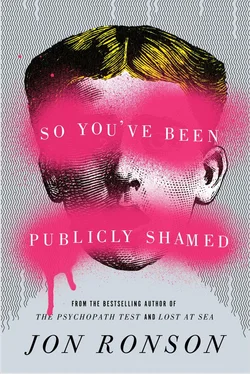But who was Justine kidding? Addis Ababa was great for a month, but she wasn’t an Ethiopia person. She was a New York City person. She was nervy and sassy and sort of debonair. And so she came back. To a town where things were still not okay for her. She had temporary work doing the PR for the launch of a dating website, but she was not back on her feet. She was still fired from her dream job. She was still ridiculed and demonized across the Internet.
“I’m not fine yet,” she said. “And I’ve really suffered.”
She pushed the food around her plate. When I thought of Justine, I thought of a store looted in a riot. She may have left the door ajar, but she was all smashed up.
But I did notice one positive change in her. The first time we’d met, she’d seemed ashamed — weighed down by the guilt that she’d “tarnished” her family by pressing send on that stupid tweet. I think she still felt ashamed, but maybe not quite so much. Instead, she said, she felt humiliated.
The week I had lunch with Justine, the European Court of Justice delivered an unexpected judgment — the Right to Be Forgotten ruling. If an article or a blog about a person was “inadequate, irrelevant or no longer relevant”—whatever those vague words meant — Google must, if requested, deindex it from its European sites (although not from Google.com). Tens of thousands of people applied to be forgotten straightaway — there’d be more than 70,000 applicants within three months. Google complied vigorously, apparently assenting to practically every request. In fact, it complied so vigorously — deindexing swaths of Guardian and Daily Mail articles, for example, and then sending the newspapers automated notices informing them that they’d been deindexed — the company seemed to be intentionally creating chaos to stir up resistance to the judgment. Articles and websites sprung up across the Internet attacking the ruling and outing the forgotten: a football referee who had lied about his reasons for giving a penalty, a couple arrested for having sex on a train (who I’d forgotten all about until then), an airline, Cathay Pacific, accused of racism by a Muslim job applicant.
Justine, following the news from New York, had “conflicting feelings immediately,” she told me. It seemed like censorship to her. And it also seemed appealing. But she knew invoking it would be a disaster for her. If the world found out — imagine the frenzy. No. The Right to Be Forgotten ruling would improve the life of some actual transgressor — some barely shamed niche European former fraudster who slipped through the outers’ net, for instance — far more than it would improve the life of the super-shamed Justine Sacco.
And so the worst thing, Justine said, the thing that made her feel most helpless, was her lack of control over the Google search results. They were just there, eternal, crushing.
“It’s going to take a very long time for those Google search results to change for me,” she said.
Eleven.The Man Who Can Change the Google Search Results
In October 2012 a group of adults with learning difficulties took an organized trip to Washington, D.C. They visited the National Mall, the U.S. Holocaust Memorial Museum, the Smithsonian, Arlington National Cemetery, and the U.S. Mint. They saw the Tomb of the Unknown Soldier. At night they sang karaoke in the hotel bar. Their caregivers, Lindsey Stone and her friend Jamie, did a duet of “Total Eclipse of the Heart.”
“They had the greatest time on that trip,” Lindsey Stone told me. “We were laughing on the bus. We were laughing walking around at night. They thought that we were fun and cool.”
Lindsey was telling me the story eighteen months later. We were sitting at her kitchen table. She lives down a long lane near a pretty lake in a seaside town on the East Coast of the United States. “I like to dance and I like to do karaoke,” Lindsey said. “But for a long time after that trip I didn’t leave the house. During the day, I’d just sit here. I didn’t want to be seen by anybody. I didn’t want people looking at me.”
“How long did that last?” I asked her.
“Almost a year,” she said.
Lindsey didn’t want to talk to me about what had happened on that trip to Washington, D.C. I had written to her three times and she had ignored each of my letters. But a very peculiar circumstance had made it necessary for her to change her mind.
• • •
Lindsey and Jamie had been with LIFE — Living Independently Forever — for a year and a half before that trip. LIFE was a residence for “pretty high-functioning people with learning difficulties,” Lindsey said. “Jamie had started a jewelry club, which was a hit with the girls. We’d take them to the movies. We’d take them bowling. We got the company to purchase a karaoke sound system. We heard a lot from parents that we were the best thing that ever happened to that campus.”
Off duty, she and Jamie had a running joke — taking stupid photographs, “smoking in front of a NO SMOKING sign, or posing in front of statues, mimicking the pose. We took dumb pictures all the time. And so at Arlington we saw the SILENCE AND RESPECT sign. And inspiration struck.”

“So,” Lindsey said, “thinking we were funny, Jamie posted it on Facebook and tagged me on it with my consent because I thought it was hilarious.”
Nothing much happened after that. A few Facebook friends posted unenthusiastic comments. “One of them had served in the military and he wrote a message saying, ‘This is kind of offensive. I know you girls, but it’s just tasteless.’ Another said ‘I agree’ and another said ‘I agree’ and then I said, ‘Whoa, whoa, whoa! It’s just us being douchebags! Forget about it!’”
Whoa whoa whoa… wait. This is just us, being the douchebags that we are, challenging authority in general. Much like the pic posted the night before, of me smoking right next to a no smoking sign. OBVIOUSLY we meant NO disrespect to people that serve or have served our country.
— LINDSEY STONE’S FACEBOOK MESSAGE, OCTOBER 20, 2012
After that, Jamie said to Lindsey, “Do you think we should take it down?”
“No!” Lindsey replied. “What’s the big deal? No one’s ever going to think of it again.”
Their Facebook settings were a mystery to them. Most of the privacy boxes were ticked. Some weren’t. Sometimes they’d half notice that boxes they’d thought they’d ticked weren’t ticked. Lindsey has been thinking about that “a lot” these past eighteen months. “Facebook works best when everyone is sharing and liking. It brings their ad revenues up.” Was there some Facebook shenanigan where things just “happen” to untick themselves? Some loophole? “But I don’t want to sound like a conspiracy theorist. I don’t know if Jamie’s mobile uploads had ever been private.”
Whatever: Jamie’s mobile uploads weren’t private. And four weeks after returning from Washington, D.C., they were in a restaurant celebrating their birthday—“We’re a week apart”—when they became aware that their phones were vibrating repeatedly. So they went online.
“Lindsey Stone hates the military and hates soldiers who have died in foreign wars,” and “Die cunt,” and “You should rot in hell,” and “Just pure Evil,” and “The Face of a Typical Feminist. Fifty pounds overweight? Check. Sausage arms and little piglet fingers? Check. No respect for the men who sacrificed? Check,” and “Fuck You whore. I hope I die [ sic ] a slow painful death. U retarted cunt,” and “HOPE THIS CUNT GETS RAPED AND STABBED TO DEATH,” and “Spoke with an employee from LIFE who has told me there are Veterans on the board and that she will be fired. Awaiting info on her accomplice,” and “After they fire her, maybe she needs to sign up as a client. Woman needs help,” and “Send the dumb feminist to prison,” and, in response to a small number of posters suggesting that maybe a person’s future shouldn’t be ruined because of a jokey photograph, “HER FUTURE ISN’T RUINED! Stop trying to make her into a martyr. In 6 months no one except those that actually know her will remember this.”
Читать дальше













